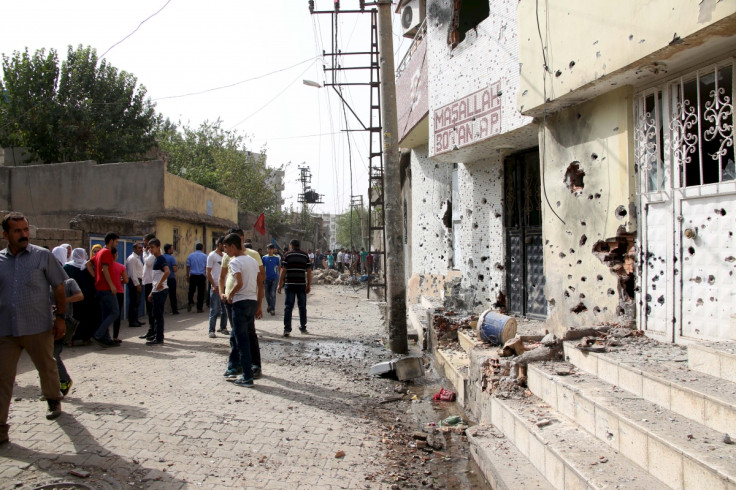Turkey kills 70 suspected PKK 'militants' in crackdown on Kurdish rebel groups

Turkey's crackdown on Kurdish militants in the south-east of the country has led to the deaths of 70 suspected members of the banned Kurdistan Workers Party (PKK) over the past few days, the country's government has confirmed, adding that two Turkish soldiers were also killed in the unrest.
Turkey began the military offensive on 16 December. It is the latest operation targeting suspected PKK members and their supporters since peace talks between the government and Kurdish separatists broke down in July. At least 200,000 people have been displaced in Turkey's predominantly Kurdish south-east since the summer, local activists have claimed.
#Kurdistan: appartment building in #Cizre caught fire after it got hit by artillery fire from the Turkish army pic.twitter.com/Xp0oHHTy8P
— Thomas van Linge (@arabthomness) December 19, 2015Officials said that approximately 10,000 security personnel backed by heavy weaponry have been involved in the crackdown. The operation has centred on Cizre and Silopi – cities considered a stronghold of the PKK, which is listed as a terrorist organisation by Nato members including Turkey.
Cizre in particular has seen running battles in recent days, with armoured government vehicles patrolling the streets and using tear gas to disperse crowds, according to the BBC. The city has been under curfew since Turkey declared it a hotbed of PKK activity in September.
#Kurdistan: photos from the streets in #Cizre, which continues to be under a siege by the Turkish army pic.twitter.com/miiFGVXAbt
— Thomas van Linge (@arabthomness) December 19, 2015#Turkey: Kurds take streets to protest Turkish regime brutality in #Diyarbakir, #Cizre and #Silopi #TwitterKurds pic.twitter.com/MZouGbym7R
— curdistani (@curdistani) December 16, 2015Revealing the latest death toll, Turkey's Prime Minister Ahmet Davutoğlu said the country will not allow Kurdish separatists to cause "chaos" in the south-east. He added that the crackdown will only intensify if the PKK attempt to escalate the conflict.
More than 40,000 people are estimated to have been killed since the PKK took up arms in its fight for an independent Kurdish state in 1984. The group maintains links, but not affiliations, with the Kurdish Peshmerga forces battling Islamic State (Isis) in northern Iraq and the Kurdish People Protection Units (YPG) and Women's Protection Units (YPJ) who have proved an effective resistance force against Isis (Daesh) in Syria.
A FEW moments ago in #Cizre. Kurds defy curfew by dancing in the streets! #TwitterKurds
#KurdishPeopleResist pic.twitter.com/5BKK3G8jHZ
— @Hevallo (@Hevallo) December 14, 2015Indeed the conflict raging over Turkey's southern border increased tensions between Turkey and the PKK is considered to be one reason why peace talks broke down in July. Activist groups throughout the region have accused Turkey of effectively turning a blind eye to atrocities carried out IS while carrying out military action on Kurds.
Others have claimed that IS terrorists are given free rein to cross in and out of the country and use southern Turkish hospitals to treat injured fighters. Following Turkey's shooting down of a Russian plane on the Turkey-Syria border, Vladimir Putin branded the Ankara government "terrorist sympathisers" and claimed to have proof that oil taken from IS-held oil fields in Syria was being transported into the Nato member state.
© Copyright IBTimes 2025. All rights reserved.





















